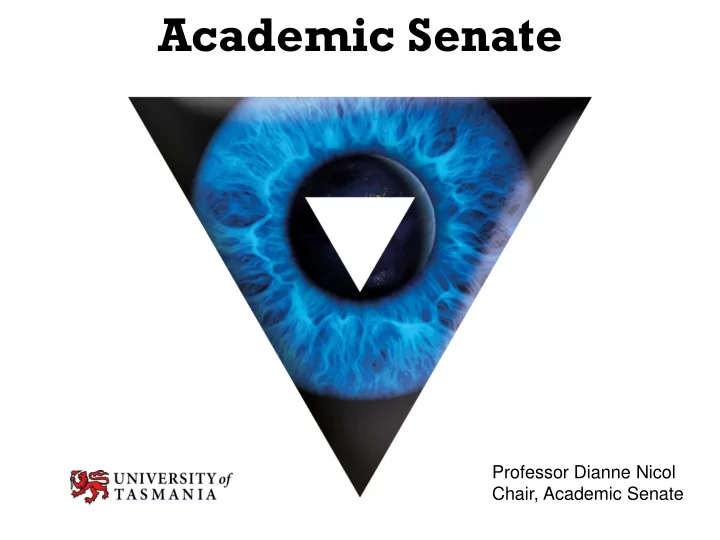

Academic Senate Professor Dianne Nicol Chair, Academic Senate
• Uni Governance • Academic Senate Presentation What we can do Format Who we are My role as Chair Challenges for 2014 What you can do What do you want Academic Senate to do for you?
• Members of Council What is • Members of the Academic Staff University? • Members of Professional Staff • Graduates • Students
University • University of Governance Tasmania Act 1992 • By-laws • Ordinances • Council • Rules • Vice-Chancellor, Senior Executive and • Policies Senior Management • Procedures Team • Guidelines • Academic Senate • Statements
• Chancellor • Vice-Chancellor • Chair, Academic Senate University • Two appointees of the Minister (not staff or Council students, one is past graduate) • One Academic and one Professional Staff Member • One Student • Up to six others (not staff or students)
Roles of Academic Senate Delegated Decision Making Roles from Council (Academic Senate Rules 1 to 4) • Approving proposals from Faculties and Institutes relating to awards • Determining qualifications for admission • Making Rules re prizes, scholarships and bursaries • Making Rules re admission, academic assessment and progress • Making Rules re graduate research and supervision
Roles of Academic Senate Advisory Role to University Council • Policies relating to academic matters • Long term academic implications of plans for allocation of resources • Processes relating to academic excellence • Commenting on reports from the VC & Senior Executive • Advising Council on matters affecting academic wellbeing
Roles of Academic Senate Collegial Role • Providing the primary collegial forum for discussion, debate and recommendations on academic matters • Maintaining an environment that supports intellectual freedom and academic integrity
Membership Chair & Deputy Chair Prof Indigenous Higher Education Vice-Chancellor TUU President, Postgrad President, Campus President & Senior Executive International Students Officer Deans/Heads of Institutes 1 externally funded Research PVC (Research Training) Fellow Heads of Schools 12 elected Academic Staff Directors of National Centres members Chairs of Faculty Boards + Observers Registrar
Committees • Admissions Policy Committee • Research College Board* • Student Experience Committee* • University Learning & Teaching Committee* • Standing Academic Committee • Academic Senate Legislation Committee • Nominations Committee • Panels for student complaints and discipline and level D/E appointments * and Sub-Committees
My Role as Chair • Chair meetings of Academic Senate (6 pa) and some Academic Senate Committees, member of other Academic Senate Committees (assisted by Deputy Chair) • Member of Council, Finance Committee, Ceremonial and Honorary Degrees Committee • Member of Vice-Chancellor’s Executive, SMT, Planning and Performance Review Committee, Academic Planning Sub- committee, Quality & Standards Committee, Internationalisation Committee, Budget Working Group • Member of Academic Promotions Committee • Member of Alumni Committee • Graduations
What are the big items for 2014? • Implications of Federal funding and regulatory decisions – 2014 Federal Budget • Reform of Tertiary Education Quality and Standards Agency • Higher Education Standards Framework • Implementation of Australian Qualifications Framework • Collegial discussions – Academic Freedom – Diversity
• Replaced Australian Universities Quality Agency (AUQA) • Focused on regulation of threshold standards TEQSA • Established Higher Education Standards Panel • TEQSA Amendment Act currently the subject of a Senate (Commonwealth) inquiry. • Amendments seek to reduce regulatory burden
• Created by TEQSA Higher • Responsible for the development and Education monitoring of Higher Education Standards Standards Framework (HESF) Panel • TEQSA mandates compliance with the Framework
• Currently in consultation phase • Sets standards for Higher – Student participation & attainment Education – Learning Environment – Teaching Standards – Research and Research Framework Training – Quality Assurance – Governance – Representation, Information & Information Management • Mandates Compliance with AQF
• AQF is a national framework • Sets specifications for Australian regulated qualifications Qualifications (Senior Secondary Certificates to Doctoral Framework Degrees) • All Higher Education Awards at AQF levels 5- 10 (Diploma to Doctoral Degree) must meet AQF specifications by 1 January 2015.
AQF Course Requirements Universities must demonstrate: • Learning outcomes for each AQF level and qualification type, including: purpose; knowledge; skills; application of knowledge and skills, and; volume of learning. • That AQF specifications for each degree level are being met and adhered to in the accreditation and development of all qualifications.
Course Accreditation Standards • Course design is appropriate and meets the Qualification Standards • Course resourcing and information is adequate • Admission criteria are appropriate • Teaching and learning are of high quality • Assessment is effective and expected student learning outcomes are achieved • Course monitoring, review, updating and termination are appropriately managed
• Nominate for membership Academic • Raise matters you would Senate – how like to see discussed at can you be Academic Senate at Faculty or Institute involved? meetings • Talk to me or other Academic Senate members
• When thinking about the academic life and work Listening of the University, what things come to mind? to you • Which of these would you most like Academic Senate to discuss? • http://www.utas.edu.au/acade mic-governance/academic- senate
Recommend
More recommend